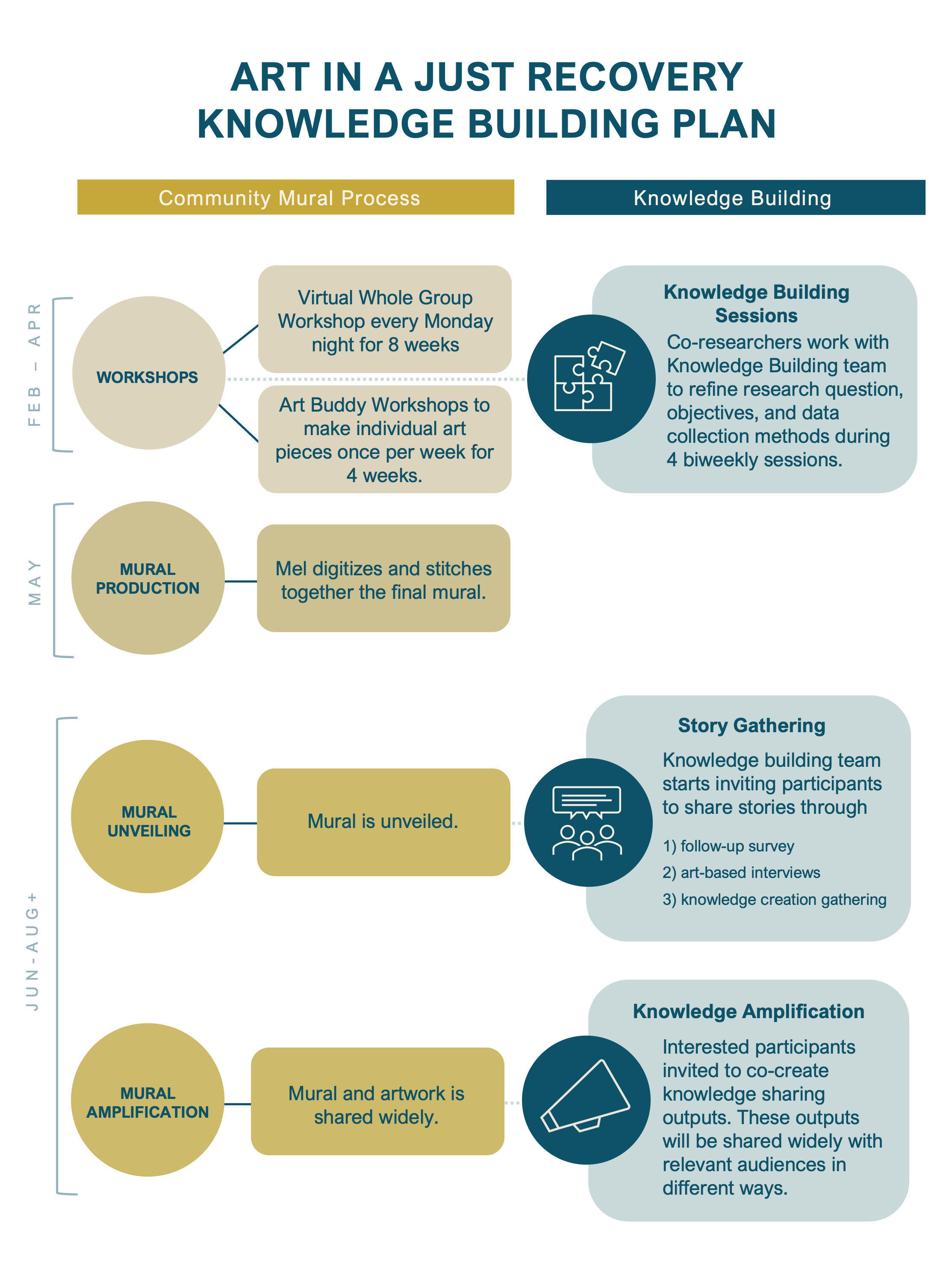art in a just recovery: impact
AIJR Research Outputs
Building knowledge about community care and collective artmaking
Process
Alongside the Art in a Just Recovery Mural project, we conducted a community-engaged research project in partnership with the GNSC, social artist Melanie Schambach, community-engaged researcher Amy Kipp, and many of the artists and community members who took part in the mural project.
Once the mural was unveiled in June 2023, we invited all those who had a hand in creating it to share about their experiences through a follow-up survey and conversation interviews. In total 28 people filled out the survey, and 18 participated in interviews where they shared the story behind the individual art piece they made as part of the mural, and their experiences making art with others. From what was shared, we built new knowledge about collective artmaking and community care.
Key ideas
Creating containers of care: Four themes emerged based on participants’ experiences during the mural project: 1) the importance participants placed on being able to come/go as they were, 2) the ability of collective artmaking to open them up socially and emotionally after the first two years of the pandemic, 3) the Mural Project’s impact beyond the collective artmaking workshops, as well as 4) moments where participants did not feel cared for during the project. These findings highlighted that when practiced with care collective artmaking can create a space (or ‘container’) of care in the city through which more caring worlds can be imagined and practiced in the here and now. Such spaces are important, but difficult to create, in a Canadian context where cities grapple with different ‘crises of care’ and funds to arts/cultural programming have been reduced.
Reimagining community care: Using art to explore Mural Project participants’ experiences of care during the pandemic illuminated care needs that surfaced in the city of Guelph. These needs resulted from increased isolation, job loss, precarious living situations, social unrest, illness, and disrupted services, among other factors. In some cases, people turned to existing forms of community care to meet their care needs; others accessed and/or helped create new forms of community care; while others, still, were unable to fully meet their needs. Finding, accessing, or creating new forms of community care in times of crisis can be difficult; as such, maintaining and continuing existing practices of community care is of utmost importance.
Sharing knowledge
This knowledge has been shared with different audiences, including through creative, community, and academic outputs as well as in other ways that are harder to pin down. The knowledge we co-created continues to circulate as we – those involved in the work – practice what we have learned in our everyday lives. You can access some of these resources below.
A series of blogs on collective artmaking and community care
A creative display at the Live Work Well Research Centre’s Reimagining Livelihoods Forum
Art as we are: Creative community care, an exhibit at the Guelph Civic Museum
Collective artmaking and reimagining infrastructures of care in the city, a presentation at the International Geographical Congress
Curating with care: Exhibiting and programming sensitive subject matter in galleries and museums, a presentation as part of the “Nurturing a Space for Community Engagement” workshop hosted at Guelph Civic Museum
Practicing for more care-filled futures: Exploring the possibilities of collective artmaking, community care, and caring research praxis through research-creation, a PhD dissertation by Amy Kipp at the University of Guelph
As we continue to share insights from the project, we will update this list, so check back in! To let us know how you use these resources, or to learn more, please contact Amy Kipp (akipp@uoguelph.ca).

